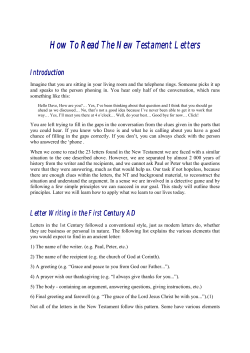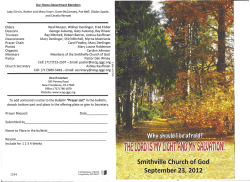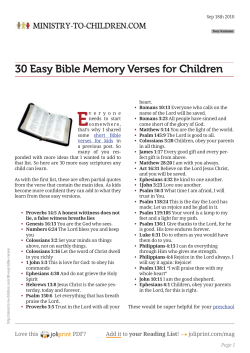
Bi ble Actually Study th e
How to Actually Study th e Bi ble Table of Contents Chapters Topic Page Welcome 1 Recommended Resources 2 Brainstorm Topics to Study 3 1 How to interpret the Bible 4 2 6 3 The Cross Reference Method of Study Using the Bible to understand the Bible Word Study 4 Topical Study 10 5 Character Study 12 6 Historical Background Study 14 7 Passage Analysis 7 Questions Approach Devotional Study Lectio Divina: “Divine Reading” 16 8 8 18 Welcome to: How to Actually Study the Bible Why Study the Bible? Many Christians would be happy to be spoon fed God's Word from their pastor or some other teacher. It is true and good that God raises up teachers and proclaimers of His word for the edification of His church. But God also desires for each follower of Christ to “correctly handle the word of truth,“ as Paul says in 2 Timothy 2:15. We are to “let the word of Christ dwell in [us] richly,” so that we can, “teach and admonish one another.” (Col 3:16) God has given His Holy Spirit to those who believe in His Son, to teach them all things. (John 14:26) But, in order to handle God's word accurately, we need to learn how to study it for ourselves. That's what this small group is about. The Approach The following pages will outline several techniques of studying the Bible. You will need to use resources beyond the Bible in order to answer some of the questions and to get the most out of this study. Please see the Resource Recommendations below. Some are found on the Internet. Some are books that can be purchased. I recommend for this study, that you use the English Standard Version (ESV) of the Bible. Each week will follow this pattern of learning: • learn a study technique. • apply that technique to a topic of interest • share what we have learned from God's Word on that topic with each other. The approaches to Bible study on the following pages will help you dig into God's word for yourself and learn about who God is, who you are, and how his Word applies to your life . Pray first Although you will be using techniques and tools to study the Scriptures, it will all be in vain without prayer. Ask God to open your mind so you can understand what He is trying to reveal to you. Paul prayed for the Ephesians, “that the God of our Lord Jesus Christ, the Father of glory, may give you a spirit of wisdom and of revelation in the knowledge of him, having the eyes of your hearts enlightened, that you may know what is the hope to which he has called you, what are the riches of his glorious inheritance in the saints; (Ephesians 1:17-18 (ESV)) This is a good prayer to pray for yourself each time you begin this study. God will teach you things that you will be able to share with others in the group and even beyond your group! May you experience God teaching you and using you in the coming weeks as you learn to actually study the Bible for yourself! In Christ, The Rev. Jay Fowler 1 Recommended Resources: (Use the English Standard Version (ESV) of the Bible) Study Bibles print version ESV Study Bible Free Software of the Bible online or to download onto your computer. Online www.biblegateway.com www.studylight.org www.biblestudytools.com/ www.blueletterbible.org ESV Bible online www.esvbible.org Download to your Computer WORDsearch Basic www.wordsearchbible.com/basic Cross Reference: Treasury of Scripture Knowledge www.blueletterbible.org Concordance/ word search www.biblegateway.com www.studylight.org www.biblestudytools.com/ www.blueletterbible.org www.esvbible.org Bible Dictionaries Vines Expository Dictionary www.blueletterbible.org http://studybible.info/vines/ Interlinear Greek /KJV Bible http://studybible.info/search/IGNT/ Holman Bible Dictionary http://classic.studylight.org/dic/hbd/ Baker's Evangelical Dictionary of Biblical Theology http://www.biblestudytools.com/dictionaries/ bakers-evangelical-dictionary/?letter=L Interlinear Bibles http://www.interlinearbible.org/ Topical Index Nave's Topical Bible http://www.biblegateway.com/topical/ Cross References Treasury of Scripture Knowledge http://www.studylight.org/com/tsk/view.cgi?b k=61 Commentaries The IVP New Testament Commentary Series (recent) http://www.biblegateway.com/resources/ivpnt/toc/ a list of commentaries with date of publication and links http://www.bibleresearcher.com/links20.html Links to hundreds of commentaries, mostly from before 1900, but some pastors from today as well http://www.preceptaustin.org/tool_commenta ry.htm Bible Background Information Bible Background. Research and Commentary by Dr. Criag Keener http://www.craigkeener.com/ Maps http://www.bible-history.com/maps/ http://www.openbible.info/geo/ 2 Brainstorm Topics to Study 3 Chapter 1 How to interpret the Bible. Important truth: God wants us to ________________ Luke 24:44 - 45 (NIV) He said to them, “This is what I told you while I was still with you: Everything must be fulfilled that is written about me in the Law of Moses, the Prophets and the Psalms.” Then he opened their minds so they could understand the Scriptures. 1. Check your _______________________ Isaiah 55:8 (NIV) 8 “For my thoughts are not your thoughts, neither are your ways my ways,” declares the LORD. 2. Read verses in _______________ Check and understand the Immediate context, and the wider context of the book your passage is in. And even the wider context of the Bible. Ask and answer the questions, Who? What? When? Where? Why? 3. Understand the _____________ Use the following tools: Concordance Bible Dictionary A Study Bible www.biblegateway.com www.studylight.org See Recommended Resource page for more 4. Interpret Scripture with _________________ Use cross references. Use the Treasury of Scripture Knowledge, see Recommended Resources. 4 5. Check the literary _______________ Poetry Prophecy Narrative Proverb Parable Letters Allegory Metaphor 6. Separate the culturally bound from _________________ ____________ Mark 6:8 - 9 (NIV) 8These were his instructions: “Take nothing for the journey except a staff—no bread, no bag, no money in your belts. 9 Wear sandals but not an extra tunic. 7. Read in _____________________ Colossians 4:16 (NIV) After this letter has been read to you, see that it is also read in the church of the Laodiceans and that you in turn read the letter from Laodicea. Colossians 3:16 (NIV) 16Let the word of Christ dwell in you richly as you teach and admonish one another with all wisdom, and as you sing psalms, hymns and spiritual songs with gratitude in your hearts to God. 8. Understand the historical __________________ Use the same tools listed above. In addition you can also consult a good commentary. The NIV Bible Background is good 9. Pray for God to help you _____________________ his word Luke 24:45 (NIV) 45Then he opened their minds so they could understand the Scriptures. 5 Chapter 2 The Cross Reference Method of Study Using the Bible to understand the Bible. 1. Choose a topic or a verse of interest. _________________________ 2. Start with your Bible verse or find a verse with your word in it. Write it here________________________ If you don’t know a Bible verse go to Step # 3. 3. Go to www.blueletterbible.org 4. Type your word or verse in the box. 5. Choose your Bible Version. 6. Click Search 7. Click on the “K” to the left of your verse. 8. Scroll down to find your word and the verses under your word. 9. Read each verse. Write down insights for each verse. Verse Insights 6 10. Click on any of those verses and follow steps 7-9 Verse Insights 11. After looking at several verses summarize your findings. 12. What is God trying to teach you right now through what you discovered from His Word? 13. What can you specifically do to begin to implement godly change in your life according to what God’s taught you? 7 Chapter 3 Word Study 1. Choose a word to study and write it here: _____________________ 2. Find all Greek and/or Hebrew words which are translated as your word. (ex. sometimes more than one Greek word will be translated with the same English word) Greek Words Hebrew words Get definitions for the Greek/Hebrew words. Note any differences in meaning between the words. 3. Find the English word in the Bible and list references. (How many times does it appear? In what books does it appear? What writers use the word? In what book does it occur the most? Where does the word first appear?) 4. How is the English word used throughout the Bible? Does this word have different uses in the Bible? If so, what are they? What is the most frequent use of the word? 8 (Optional) 5. Choose a Greek or Hebrew word to study. Find the Greek/Hebrew word in the Bible and list references. (Use Vines Expository Bible or a Greek/ Hebrew Concordance) Does this word have different uses in the Bible? If so, what are they? Find all the different English words that are used to express the Greek/Hebrew word you are studying. What is the most frequent use of the word? 6. Define and analyze the word. What is it? Who does it? (God? Jesus? Spirit? believers? non-believers? Satan?) What does it mean? (Use the Holman Bible Dictionary) 7. Aplication How can understanding this word strengthen my relationship with God? How can it effect how I interact with others? How can I apply what I’ve learned from this Word study to my life right now? Who is someone I could share this with? 9 Chapter 4 Topical Study 1. Decide on your topic: __________________________ 2. Compile a list of words related to your topic. 3. Make a list of references for each of the words. Write down observations and insights about what each verse says about your topic. Word Verse Observations and Insights 10 4. Group similar observations and their corresponding verses together. Use highlighters to group similar verses/observations or rewrite the words and verses in groups. Give each grouping a title, sentence or phrase to describe it. 5. Make a list of your findings on the topic based on the groupings you made. 6. Summarize your findings in a paragraph. 7. Application Explain how God wants to use your learnings in your life right now. Write out specific steps to begin to apply your findings Who is someone you could share your findings with? 11 Chapter 5 Character Study 1. Choose a person to study write their name here: _____________________ (Remember that some names are used for more than one person) 2. Write down what their name means. 3. Make a list of all the scripture references of the person and the corresponding details. 4. When and where did they live? 5. Make a chronological outline of their life. List the special events in their life. Year Born Special Events Died 12 6. What are their admirable qualities? 7. What character defects did they have? 8. How did God use them? 9. How are you like this person? 10. How are you different? 11. Application Looking at their life what would you like to imitate? What would you like to avoid? Who is someone you could share what you’ve learned with? 13 Chapter 6 Historical Background Study 1. Choose a subject, event, or book of the Bible:______________________________ 2. Set the time frame: When did the event happen? When was the book written? When did the subject live? What was going on in the Bible at the time? When in the Chronology of the Bible did your event/subject matter happen? What happened before and after your event or subject? What was going on in surrounding cultures at and around the time? 3. Get insights from geography. Locate your event/subject on maps of the ancient world, especially from the time period you are studying. Is there more than one possible location? If so list all places. Explain which you believe to be the best choice and why. Where on a modern map would your event/subject be? 4. Get insights from archeology Have there been any discoveries pertaining to your event/subject? What are they? When were they discovered? What year does the discovery date to? Where were they discovered? How reliable is the discovery? 14 5. Get insights from Cultures What were the cultural norms and practices of the time for God’s people? What were the culture and norms of people surrounding God’s people? How were they different? How were they the same? 6. Get insights from the political situation. Who is in charge? What kind of government is in place? How does that affect the people in the Bible? How does it affect surrounding cultures? How does God feel about the political situation? 7. Summarize your findings. 8. Make it relevant In what ways are the circumstances surrounding your event/subject similar to today? In what ways are they different today? What can be learned from the past to help you or your community right now? 15 Chapter 7 Passage Analysis 7 Questions Approach 1. What does it say? (Read the passage aloud to yourself or others.) 2. What is the setting/ context? For a Letter/Prophetic book: (Who is writing this? Where is he writing from? Who is he writing to? Where are the recipients? When was it written? What is the purpose of the letter?) For a Narrative book: (Where is it? Who’s there? When is it? What does it look like, sound like, smell like, feel like or taste like?) For immediate context: What was said just before? Is there a theme the writer is developing? What follows in the text? How does this passage fit with the overall point the writer is making?) 3. What do the words mean? Write down any words that are unfamiliar to you or that you would like more information on. Pay attention to words that are repeated in the passage. Use a Bible Dictionary, Study Bible or Commentary to help you find the answers. 16 4. What does it tell me about God? (Father and/or Son, and/or Holy Spirit?) What is He like? What does He do? What does He say? What does he not like? What does he give or offer? 5. What does it tell me about people? What does this say about people in general? What are they like? What are they prone to? How do they relate to God? What does this say about me in particular? Am I convicted or encouraged by anything ? Is there a growth area for me to pursue? Is there a promise for me to believe? 6. How does it apply to my life? Consider applying what you have learned to one or more of the following areas of your life. Write down at least one thing to work on this week with God’s help. Friends: Family: Work: Church: School: God: 7. What should I pray for? In light of what God revealed to you in this passage what could you pray about this week? 17 Chapter 8 Devotional Study Lectio Divina: “Divine Reading” One form of Christian meditation that has been widely used since at least the Fourth Century AD is the Lectio Divina method. This approach centers on loving God and being transformed through His Word. Traditionally used in monastic religious orders, it is having resurgence today, and many are being drawn to it. Over the centuries this practice has become widely appreciated as a way of enriching and transforming one’s faith life. It is a great balance to Bible study in that it is an experiential approach. (more right brain than left brain) It is not designed to replace good in depth Biblical study. But rather it is another way to learn to hear God speak to you through His Word It is basically divided up into four sections: • lectio (reading) • meditatio (meditation/reflection), • oratio (response/affective prayer) • contemplatio (rest/contemplation). Lectio Divina works with any passage of scripture, but lends itself to narrative, to stories in the Bible, the Gospel and Acts in particular. Use the outline on the following page as a guide through the 4 steps. Please remember that this technique should not replace deeper study of God’s Word. Using an experiential approach like Lectio Divina without a balance of good Biblical study, can lead some people into error. They could be tempted to raise their subjective feelings over Biblical truths. But learning to slow down and listen to the living Lord Jesus through His word is an important skill to learn as well. So go with the Holy Spirit and enjoy Lectio Divina. 18 Lectio Divina: “Divine Reading” Select your Passage: ________________________ Read (lectio) the passage out loud (even if you are alone). Ask God to put you in the story. What do you see? Hear? Smell? Taste? Feel? Who’s there? What’s happening? Who do you identify with? Read it again, this time; Reflect/meditate (meditation) on what you’ve read. Ask: “What do You want to say to me today, Lord?” Read it again and notice what word, phrase, or truth jumps out at you. Ask: “Lord, why this word, this phrase, etc;.?” Reflect on what comes to mind. What is God showing you about Himself, His people or you? Read it again, this time; Respond (oratio) to what you hear Ask: God, what are You inviting me to do in response to this? Write down what God is putting on your heart to do. (to give thanks, to love God more, to worship, to confess, to ask for help to receive grace, to surrender something, to accept someone, to rest, to step out in faith?) Read it again, this time; Rest (contemplatio): Take time to linger in God’s Presence. Say, “thank you Jesus for being with me and speaking to me today.” Enjoy your encounter with God Let Him fill you and replenish you. 19 20 © The Rev. Jay Fowler June 2013
© Copyright 2025









